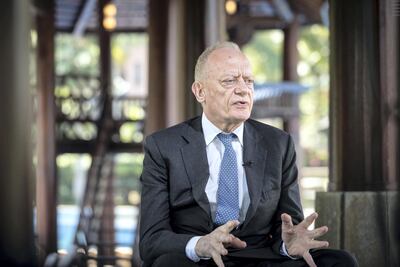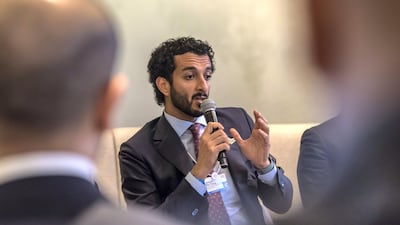There has never been “a better climate” for a free trade agreement (FTA) between the UAE and UK with a deal set to benefit both countries, according to the UAE’s minister of economy and Britain’s minister of investment.
In a webinar discussion with Abdulla bin Touq Al Marri, UAE minister of economy, Lord Gerry Grimstone, the UK’s minister of investment, said the UK was moving towards a free trade agreement between Britain and the GCC.
“The trade and investment review is one of the precursors for getting into a trade agreement … and we have no doubt that the complementaries between the UK economy and the GCC economy mean that a trade agreement between our two nations would give really synergistic benefits to each nation,” Mr Grimstone told the Bloomberg webinar, which focused on the growth and partnership between the two countries on Tuesday.
“These things take time to do but there’s never been a better climate than we have at the moment. It’s not something that’s going to appear within weeks or months but I really hope that as we move through 2021 we are going to find that an FTA between the UK and the GCC is right up there on our mutual agendas, with all the benefits that it would bring investors and businesses in both countries.”
Mr Al Marri said the strong ties and partnerships binding the UAE and UK go back for decades, with the "robust partnership between the two countries ... built on the strong foundations of a dynamic bilateral trade relationship".
“The UAE supports the beginning of free trade negotiation between the GCC countries and the UK, and looks forward to expanding our network of free trade agreements signed with various strategic partners, most notably with the UK,” he said.
The Joint Economic Committee between the UAE and UK, held in late November, allowed the two countries "to explore the development of a roadmap for enhancing cooperation across priority sectors, including trade investments", Mr Al Marri said.
With the end of the Brexit transition in just a matter of weeks, Britain has still not signed a trade agreement with the European Union.

Mr Grimstone said the UK has had to "rediscover" its trade policy as it conducts its own affairs for the first time in 50 years. This has led to more than 54 trade agreements being made with countries across the globe, with more in the pipeline.
Mr Al Marri said the UK is the UAE’s third leading trading partner in non-oil commodities trade today, while the UAE was the UK’s top Arab trade partner in 2019, accounting for 32 per cent of the UK’s foreign trade with Arab countries.
Non-oil foreign trade between both countries in the first eight months of 2020 was valued at approximately $5.5 billion, he said, with the UAE’s non-oil exports to the UK accounting for nearly $500 million, reflecting a growth rate of 25 per cent.
“The strong bilateral relationships between the UAE and UK are also evident on several non-trade related fronts. For instance, the UAE is home to several British companies today,” Mr Al Marri said.
“In terms of investment, with a value of $20.5bn, the UK accounts for 60 per cent of the total FDI (foreign direct investment) balance in the UAE as of the end of 2018. Meanwhile, the UAE direct investment in the UK accounted for $7.2bn by the end of 2018," he said.
Mr Al Marri outlined how the UAE’s handling of the Covid-19 crisis was the fastest in the region and provided an opportunity to not only address the pandemic but also set the stage for the country's transition to a more flexible and sustainable economic model.
This transition is characterised by “a slew of measures and policy reforms that have the potential to spur sustainable economic growth”, he said, including the country’s $77bn economic stimulus package to prop up private sector companies during the pandemic.
He pointed to legal reforms that have taken place, such as recent amendments to commercial company ownership law, which now allows foreign investors to own 100 per cent of their ventures, as well as initiatives to attract investors through long-term residence visas in the country's golden visa programme.
Other moves towards a more sustainable economy include new amendments to the country’s bankruptcy law and the decriminalisation of bounced cheques, he said.
“We believe that these policy reforms and initiatives will serve as an additional impetus to strengthening joint cooperation opportunities, thereby paving the way for investors in the UK’s private sector to enhance their presence in the UAE market,” he said.
Mr Al Marri also thanked Britain for the November opening of the UK-UAE air corridor, which allows UAE residents to fly into the country without having to quarantine for two weeks.
The move will stimulate the movement of people and goods and "significantly enhance trade and tourism flows between the two countries", he said.
In turn, Mr Grimstone thanked the UAE for support at the height of the pandemic when the Emirates repatriated "stranded British nationals", and made a generous donation of PPE equipment, including 100,000 Covid-19 testing kits to the UK.
"Your help during the crisis has not been forgotten," Mr Grimstone said.
He was speaking as the Pfizer/BioNTech Covid-19 vaccine was rolled out in the UK.
Going forward, Mr Al Marri said both countries should invest heavily in research and development and healthcare as the world moves into a post-Covid economy and learns from the crisis.
In turn, Mr Grimstone said the UK can help the UAE's recovery from the crisis and bid to diversify its new economy by forging “natural partnerships” in sectors such as artificial Intelligence, education and skills, health and life sciences, financial services, FinTech and education.


